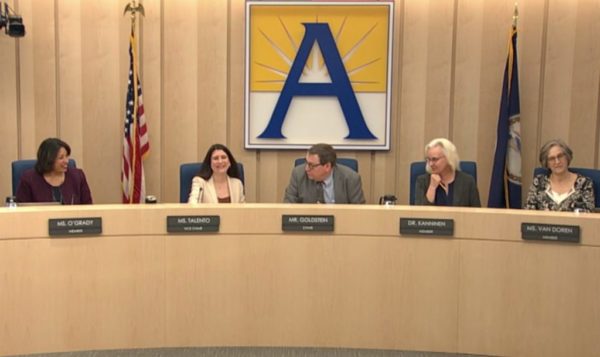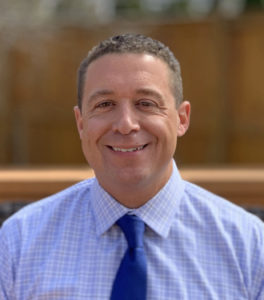Progressive Voice is a weekly opinion column. The views and opinions expressed in the column are those of the individual authors and do not necessarily reflect the views of their organizations or ARLnow.com.
To inform voters, Progressive Voice asked each candidate in the upcoming Democratic caucus for School Board to respond to this question: “The community has heard a lot about issues regarding a fourth high school, the capacity crunch, and school budget. What is a different major issue affecting students’ future success that you would address as a School Board member?”
 School Board Chair Reid Goldstein
School Board Chair Reid Goldstein
Arlington Public Schools are rightly considered excellent, and our students’ achievement is remarkable. But the stress on our students, from demanding classes, competition, peer pressure and just being an adolescent or pre-adolescent are showing up in alarming ways.
The Youth Risk Behavior Survey (YRBS) is taken by 6th, 8th, 10th and 12th graders nationwide. These are some of the Arlington students’ responses from 2017
- About 340 high school students attempted suicide
- Half of the 8th, 10th and 12 grade girls were sexually harassed
- Illegal use of over-the-counter medications by 6th grade students has increased from 2% in 2013 to 11% in 2016
- More than a quarter of 8th grade students have used alcohol.
This is a big problem and growing worse. To serve our students well, we must do more to reduce their stress.
Student stress is a community health issue that requires a community response. I will continue to support efforts to:
- Push harder on bullying and harassment prevention, making sure every student is acknowledged, accepted and safe;
- Continue expanding the number of social workers and psychologists;
- Support social and emotional learning, particularly in building empathy;
- Teach students how to moderate their stress; and
- De-emphasize academic competition in favor of personal achievement that boosts personal goals.
Programs supporting these goals are essential, not frills.
Students can engage more with each other on similar anxiety topics when they understand that their peers are struggling with the same issues.
Parents need to talk to their children, but empathetically, realizing that the child’s developmental and school experiences are different from the parents’ experiences.
And we all need to pause and remember that we are in this together as teammates, not competitors.
Under the Arlington Public Schools’ (APS) 1:1 Initiative, every student in grades 3-12 (2nd grade is shared) will be provided a personal computing device. Providing digital devices to every student is an ambitious and reasonable proposition in light of the Internet age and the workplace demands for digital literacy. Yet questions remain about the most effective use of technology, both in the classroom and at home, for supportive learning, critical thinking and problem solving skills.
On March 28, 2019, APS with the help of the Friday Institute for Educational Innovation, released the 1:1 Study (Phase 1): Preliminary Findings survey which evaluates the use of personal digital devices in the classroom, comparing benefits and drawbacks from the perspective of teachers, students and parents. Among the initial findings, the Institute noted that:
- Students are using their devices 47% of the time in class.
- Teachers report a range of 66-85% positive outcomes on student development.
There is difference of 26-40% in opinion from the parents, with the parents questioning the effectiveness of the program.
While the 1:1 Initiative is essential for digital literacy, it is crucial to ensure that all students have a balance of skills that include mastery in collaboration, creativity and problem solving. As lifelong learning becomes the norm, it is essential that interest based learning is student driven, not technology driven.
The success of all Arlington students cannot be solely dependent on learning any single type of technology or digital platform. As a candidate for School Board I will strive to bridge the gap between the frustrations of parents and the perceived effectiveness of the program by making sure that all voices–teachers, parents and students–are included and remained informed as changes in the program are developed by APS.
Reid Goldstein is a 33-year resident of Arlington. He began his service on the School Board in January 2016 and has been the School Board Chair since July 2018.
Dave Priddy is a native Arlington resident who grew up attending APS Schools. He and his wife Melanie have two children in the Arlington Public Schools system. He enjoys playing basketball, tennis and Muay Thai.



